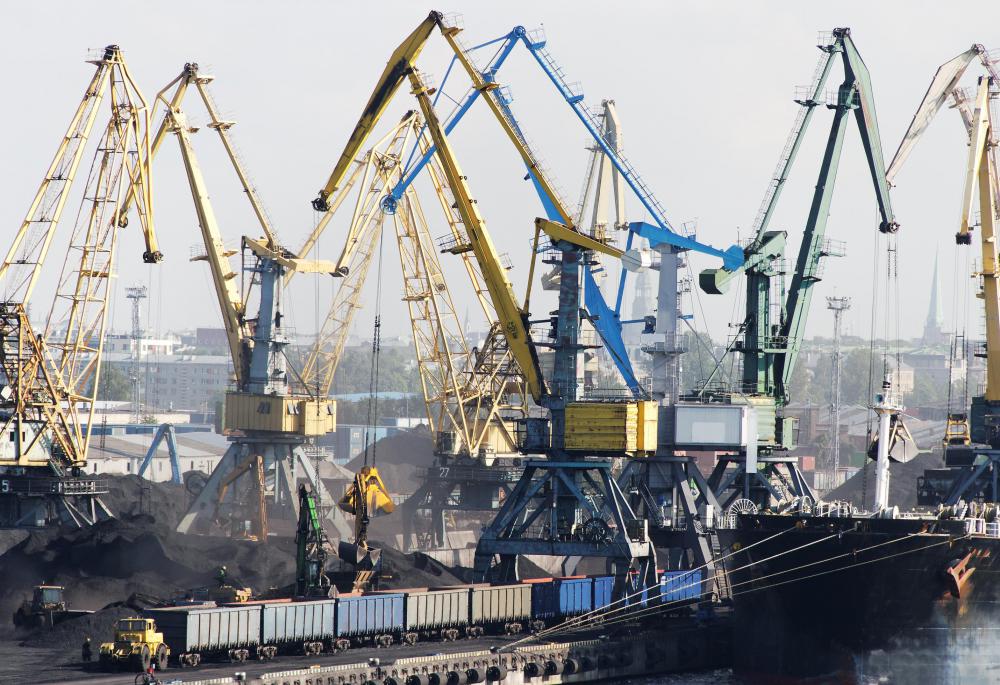At WiseGEEK, we're committed to delivering accurate, trustworthy information. Our expert-authored content is rigorously fact-checked and sourced from credible authorities. Discover how we uphold the highest standards in providing you with reliable knowledge.
What Are the Different Types of Restrictions on International Trade?
Restrictions on international trade come from three main sources. The most predominant one is individual government policies by nations, such as tariffs, which are a tax on imports brought into a country or quotas that limit the quantity of a product that can be sold. Secondly, international trade organizations such as the World Trade Organization (WTO) or allied trading blocs can promote international finance or standards procedures that some outside nations and industries cannot live up to and which lock them out of foreign markets. Other types of restrictions on international trade often arise from intangible or entrenched cultural and political barriers, where the dynamics of what makes up a country's gross domestic product (GDP) becomes uncompetitive on the world stage.
Tariffs have been a key component of world trade throughout the industrialized world as of 2011, and international efforts to establish free trade have always met with mixed success. A major move towards a free-trade initiative in 2009 found that 17 of the 20 major industrialized countries involved were violating the agreement by establishing protectionist legislation, such as tariffs. This included such widely different nations as China, the United States, and Mexico.

A World Bank report on restrictions on international trade during the 2009 negotiations found that trade across national borders had seen its sharpest decline in 80 years. Small nations such as Ecuador often took the direct route of raising tariffs on hundreds of imported products, but restrictions on international trade often go well-beyond obvious government policies. Argentina, China, India, and the European Union all imposed other measures, from adding layers of licensing and regulation to overseas suppliers to effectively lock them out of local markets, to providing export subsidies and tax rebates to local producers to make their products more competitive in foreign markets. Often such subsidies or tariffs skew the actual price of a product so much that dumping occurs, where it is sold below cost, inflating GDP figures for trade in a manner that does not reflect reality.

The process of globalization has often been criticized for imposing restrictions on international trade as well from the point of view of developing nations. Both restrictive international standards for manufactured products, as well as lending policies by organizations such as the World Bank and International Monetary Fund (IMF) that are strongly influenced by the first world nations, have pushed developing nations to focus their exports on raw materials and natural resources. These exports fuel the production of cheap products in advanced nations, and, due to the low value of raw materials relative to manufactured products, they tend to keep poor countries poor. Such behavior has locked nations such as those of Latin America and the Caribbean into a perpetual "banana republic" state, where their chief exports are low-cost agricultural products that cannot fund domestic spending on education and infrastructure modernization.
Cultural and political barriers also impose restrictions on international trade. Obvious examples include failed communist regimes, such as that of the Soviet Union that dedicated the bulk of its industrial capacity to weapons production during the Cold War. After the collapse of the Soviet Union in the late 1980s, Russia and other key states that were former members found that they had outdated industries that could not be converted to consumer goods production of products that would be competitive on the world market. In the same political vein, trade embargoes that are imposed on nations to restrict the development of advanced weapons or for other political goals often have the deleterious side-effect of suppressing foreign trade of all types by such embargoed nations.
AS FEATURED ON:
AS FEATURED ON:












Discussion Comments
I think it's unfortunate that some countries don't trade with one another for political reasons. Trade is for the betterment of all. If politics were kept out of it, all economies would benefit and develop.
I don't think that international trade organizations restrict trade for some countries. Foreign companies will want to work in a country only if it is stable. Unfortunately, most poor countries are coincidentally also in conflict and their governments frequently fail. Who would want to trade with a country like that?
Companies need stable exchange rates, interest rates and low tariffs to do business and trade. And these cannot be found in an unstable country. That's all there is to it.
I can't believe how some poor countries are forced to stay poor because they're not accepted into the WTO. I understand that the WTO has its own standards, but how can these countries get there if they can't take part in the global economy? They need more money to improve their infrastructure and governance.
Some people praise the WTO for making trade easier. That's true, but it only makes trade easier for the rich countries.
Post your comments